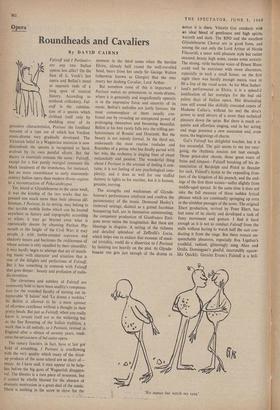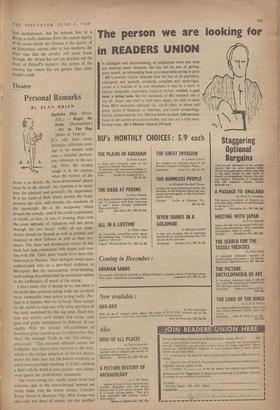Opera
Roundheads and Cavaliers
By DAVID CAIRNS Falstaff and 1 Puritani- are any two Italian operas less alike? On the face of it, Verdi's last opera and Bellini's stand at opposite ends of a long span of musical history. According to textbook orthodoxy, Fal- staff is the culmina- tion of a species which civilised itself only by shedding most of its primitive characteristics, Puritani the fossilised remains of a type out of which late Verdian music-drama very gradually developed. The Victorian belief in a Wagnerian mutation is now discredited; the species is recognised to have evolved by its own painful efforts. But the theory in essentials remains the same: Falstaff, except for a few purely vestigial remnants (its block treatment of the trombones, for instance), has no more resemblance to early nineteenth- century Italian opera than modern Homo sapiens to a reconstruction of Pithecanthropus Yet, heard at Glyndebourne in the same week, it was the kinship of the two works that im- pressed one much more than their obvious dif- ferences. 1 Puritani, in its setting, may belong to that terrible mobile limbo which can be-located anywhere in history and topography according to whim; it may go beyond even what is operatically decent by choosing Puritan Ply- mouth at the height of the Civil War; it may people it with feeble-minded sopranos and shadowy tenors and baritones the recklessness of whose actions is only equalled by their absurdity; it may hardly begin to attempt that art of match- ing music with character and situation that is one of the delights and perfections of Falstaff. But it has something in common with Falstaff that goes deeper : beauty and profusion of melo- dic invention. moment in the third scene when the heroine Elvira, already half round the well-travelled bend, hears from her uncle Sir George Walton (otherwise known as Giorgio) that she may marry her dashing Cavalier, Lord Arthur.
But somehow none of this is important. / Puritani makes no pretensions to music-drama; where it is genuinely and magnificently operatic is in the expressive force and sincerity of its music. Bellini's melodies are justly famous; the most commonplace of them usually con- found one by revealing an unexpected power of prolonging themselves and becoming beautiful. Bellini at his best rarely falls into the trifling per- functoriness of Rossini and Donizetti. But the beauty is not merely formal. In the third act, underneath the most routine roulades and flourishes of a prima who has finally parted with her wits, the orchestra is singing lines of sweet melancholy and passion. The wonderful thing about / Puritani is the amount of feeling it con- tains; it is not feeling of any psychological com- plexity, and it does as well for one stuffed dummy in tights as for another, but it is human, genuine, moving.
The strengths and weaknesses of Glynde- bourne's performance reinforce and confirm the paramountcy of the music. Desmond Heeley's timbered settings, skeletal as a gutted Jacobean banqueting hall, are in themselves uninteresting; the competent production of Gianfranco Enri- quez never seizes the imagination. But these are blessings in disguise. A setting of the richness and detailed splendour of Zeffirelli's Lucia, which helps one to endure that monster of musi- cal triviality, could do a disservice to 1 Puritani by insisting too heavily on the plot. At Glynde- bourne one gets just enough of the drama to The cleverness and subtlety of Falstaff are commonly held to have been senility's compensa- tion for the vanished faculty of turning out in- numerable '11 balens' and 'La donna e mobiles.' So Bellini is allowed to be a mere spinner of effortless cantilenas without a thought in their pretty heads. But just as Falstaff, when you really know it, reveals itself not as the withering but as the fine flowering of the Italian tradition, a work that is all melody, so I Puritani, revived in England after a silence of seventy years, vindi- cates the seriousness of bel canto opera.
The canary fanciers, in fact, have at last got hold of something. l Puritani is overflowing with the very quality which many of the dried- up products of the same school are so short of— music. As I have said, it may appear to be help- less before the big guns of Wagnerish disappro- val. The libretto is a rare piece of nonsense, but it cannot be wholly blamed for the absence of dramatic motivation in a great deal of the music. There is nothing in the score to show for the notice it is there. Vittorio Gui conducts with an ideal blend of gentleness and high spirits, warmth and dash. The RPO and the excellent Glyndebourne Chorus are in good form, and among the cast only the Lord Arthur of Nicola Filacuridi, a tenor with pleasant style but rather strained,-brassy high notes, causes some anxiety. The strong, virile baritone voice of Ernest Blanc could well be exercised with more discretion, especially in such a small house; on the first night there was hardly enough mezza voce to fill a line of the vocal score. As for Miss Suther- land's performance as Elvira, it is a splend:d justification of her nostalgia for the bad old palmy days of Italian opera. Her descending runs still sound like skilfully executed copies of Madame Callas's, without (to me) the diva's power to send shivers of a more than technical pleasure down the spine. But there is much ex- quisite and effortless singing, and in her acting and stage presence a new assurance and, even more, the beginnings of charm.
Gui's Falstaff has delightful touches, but it is less successful. The gait seems to me too easy- going, the rhythmic tension not taut enough. Those pistol-shot chords, those great roars of brass and, timpani—Falstaff breaking off his de- nunciation of Bardolph and Pistol to thunder for sack, Falstaff's hymn to the expanding fron- tiers of the kingdom of his paunch, and the end- ings of the first three scenes—suffer slightly from middle-aged spread. At the same time it does not take the full measure of those sudden lyrical phrases which are continually springing up even in the nimblest passages of the score. The original Ebert production, revived by Peter Ebert, has lost some of its clarity and developed a rash of fussy movement and gesture. I find it hard enough as it• is not to conduct Falstaff from the stalls without having to watch half the cast con- ducting it from the stage. But there remain un- quenchable pleasures, especially Ilva Ligabue's youthful, radiant, glitteringly sung Alice and Oralia Dominguez's gleeful, inscrutably squaw- like Quickly. Geraint Evans's Falstaff is a brit- 'No names but watch my eyes.' 'lam performance, but he reduces him to a Blimp, a crafty clubman Even the superb dignity of his scene beside the Thames is the dignity of an Edwardian colonel who at last swallows the bitter fact that the cavalry will never break through. Mr. Evans has not yet plucked out the heart of Falstaff's mystery-the genius of the creative liar whose lies are greater than other People's truth.



































 Previous page
Previous page